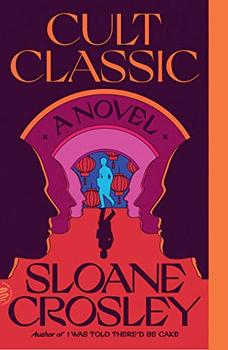Summary | Excerpt | Reviews | Beyond the book | Read-Alikes | Genres & Themes | Author Bio

In Scattered All Over the Earth, Yoko Tawada's 2018 lightly dystopian novel, a ragtag group of young people crisscross Europe searching for anyone who speaks the lost language from a disappeared country known only as the Land of Sushi. The group is led by Hiruko, a woman from the Land of Sushi who was studying in Copenhagen when her country sank into the ocean in a futuristic environmental disaster; now, she's stuck in Europe with no idea what happened to her home and no one with whom to speak her native language. Scattered All Over the Earth is weird and charming, satirical in an undefinable way, exalting in the playfulness and possibilities of language. Its characters of various nationalities and ethnicities have a youngish, leftish attitude of anti-dogmatism and anti-nationalism; the book questions what it means, and whether it's important, to be a "native" speaker of a language or citizen of a country.
Suggested in the Stars picks up where Scattered All Over the Earth left off. In the first book, Nanook, from Greenland, who worked in a sushi restaurant in Germany, tells Hiruko that he's heard stories of a guy from the Land of Sushi named Susanoo (see Beyond the Book). Susanoo cofounded the restaurant a few generations ago, but soon left Germany for Arles in the south of France, so the gang heads to Arles to find him. Tawada's world is a bizarro one, more surrealist than sci-fi in tone. Things that should be normal and easy, like lying to your mom about where you're going for the weekend, are impossible, and things that should be impossible, like tracking down someone who moved to France decades ago and is now a hundred years old, are done without a second thought.
In Suggested in the Stars, Knut, another friend, brings Susanoo—successfully found, but seemingly unable to speak—to a speech loss doctor he knows in Copenhagen so that Susanoo can regain his native language and speak with Hiruko, although this ongoing plot device that worked so well in the first book loses its luster a bit over the course of this one. The hospital in Copenhagen, as well as the speech doctor Velmer, are explicitly cribbed from Lars von Trier's The Kingdom, a Twin Peaks-like horror TV series (references to the director and the series pepper both novels). It's a fun choice, but also an early sign that Tawada's playfulness and irreverence are getting a bit unwieldy. Velmer is a great character—everyone thinks he's scary and cruel, but in his head he's a friendly guy just telling it like it is, a disconnect that Tawada plays to great comedic effect. Velmer's conservativism and cynicism butt up against the gang's wholesome belief that getting Susanoo to talk is some sort of linguistic linchpin and moral responsibility. In an exemplary funny passage, Velmer thinks about Susanoo's situation and dismisses it:
"Specialists do not regard taciturn people as aphasia patients… Hasn't he simply forgotten German? He has no knowledge of Scandinavian languages whatsoever. A condition he has in common with most of humanity which, while unfortunate, is not a disease. The problem is his mother tongue. 'He wants to speak it but can't,' Knut declares, looking terribly earnest, 'and that's a terrible psychological burden.' Yet this is not something Susanoo himself ever said."
In the Kingdom-like hospital, with older characters like Velmer and Knut's mother playing foils to the younger generation, we get funny and substantial conversations about language, flirtatious banter, and personality clashes—scenes and stories that remind us of how complex and interesting the world is. The chapters from Knut's and his mother's perspectives are the strongest in the book—not coincidentally because they mostly break away from the main narrative arc and establish a new, semi-surreal narrative and mystery: Why did Knut's father leave their family years ago? Was he duped into taking part in a crime and had to change his name? Did he think that Knut's babytalk babbling was delivering him messages from outer space? Knut's chapter functions as a hilarious Borges-like story, in which academics around the world are sending him their work because they think he's editing a collection of scholarly papers, which he isn't: "The editor of a famous magazine is supposed to have interviewed me about this plan, but I don't remember it, and besides, no well-known magazine would approach me in the first place. In fact, no magazine, famous or not, has ever contacted me. What's really strange is that even though lots of people claim to have read it, the interview itself is nowhere to be found."
But in other parts, the episodic structure is too unfocused, to the point where the novel doesn't really feel about anything the way its precursor did. As Velmer treats Susanoo at the hospital, three members of the friend group journey their way from Germany to Copenhagen via planes, trains, and automobiles. These chapters are charming and representative in their own way, full of wordplay and musings about language, and occasion some flashes of offbeat brilliance, as when one character asks another if silence can be a commercial product:
"Are you asking me because I work at the Karl Marx Haus?"
"No, I was thinking of Susanoo. What he's producing is silence."
"Who's he selling it to?"
"By not speaking, he's generating all sorts of economic activity—people are paid to give him medical treatment and see to his daily needs, his friends travel to see him, and maybe even buy him flowers."
But these episodes can also drag on somewhat pointlessly, with dialogue that at times devolves into empty, superficial repartee. When strange things happen, they feel meaningless, and not in an existential way—it seems as though the intentional confusion of meaning, the constant question of which characters will reappear later and which narrative threads will be picked up again, is a substitute for genuine coherence. The book's chapters are full of interrelated references and imagery—images of floods and rivers and waves; myths about snakes; Oedipus complexes and allusions to Freud and Hamlet and repressed childhood memories—but these references serve mostly to connect the chapters to each other and not to any central meaning. It's all layers on top of each other, but doesn't add up to anything.
And yet, Suggested in the Stars is more interesting, witty, playful, and weird than, I have to assume, most books published today; I can quibble with some of the twee irreverence, with the frustrating lack of structure, with the jokes that try a little too hard, but I can also pick up the book and go to any page and become immersed in any character's often fascinating thoughts about language and moving quest for human connection. Tawada's ear for slang and cliché, and her ability to smash them together to make something truly original (with help from her excellent translator, Margaret Mitsutani) reminded me of Nell Zink's The Wallcreeper, and her characters' way of talking so straightforwardly to each other that the dialogue becomes affected and ironic reminded me of Percival Everett's Dr. No, both novels from comic geniuses. There's so much here, so many funny little interactions and surreal details—there's something to be said for sitting back and enjoying the ride, and not worrying too much about where it takes you.
![]() This review
first ran in the October 2, 2024
issue of BookBrowse Recommends.
This review
first ran in the October 2, 2024
issue of BookBrowse Recommends.

If you liked Suggested in the Stars, try these:

by Sayaka Murata, Ginny Tapley Takemori
Published 2025
From the author of the bestselling literary sensations Convenience Store Woman and Earthlings comes a surprising and highly imaginative story set in a version of Japan where sex between married couples has vanished and all children are born by artificial insemination.

by Sloane Crosley
Published 2023
Hilariously insightful and delightfully suspenseful, Cult Classic is an original: a masterfully crafted tale of love, memory, morality, and mind control, as well as a fresh foray into the philosophy of romance.
The single biggest problem in communication is the illusion that it has taken place
Click Here to find out who said this, as well as discovering other famous literary quotes!
Your guide toexceptional books
BookBrowse seeks out and recommends the best in contemporary fiction and nonfiction—books that not only engage and entertain but also deepen our understanding of ourselves and the world around us.